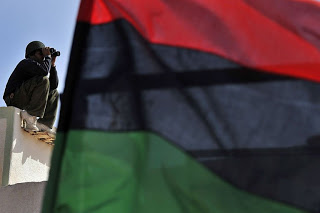Gates: Kadhafi did not pose an “actual or imminent threat” to the United States and Libya was not a “vital interest.”
 |
| © AFP Aris Messinis |
WASHINGTON (AFP) – The Obama administration defended its intervention in Libya on Sunday by saying that refugees fleeing Moamer Kadhafi could have destabilized the revolutions in neighboring Egypt and Tunisia.
The new vein of justification came as President Barack Obama prepared to answer criticism from lawmakers that he should have consulted Congress before committing the United States to a conflict with no clear exit strategy or endgame.
Defense Secretary Robert Gates and Secretary of State Hillary Clinton toured the Sunday morning news shows ahead of Obama’s primetime address at 7:30pm (2320 GMT) on Monday at the National Defense University in Washington.
But a frank admission from Gates that Kadhafi did not pose an “actual or imminent threat” to the United States and that Libya was not a “vital interest” appeared to provide yet more ammunition to the president’s critics.
Gates and Clinton offered the argument that the United States had to intervene in Libya for humanitarian reasons and because the turmoil there could have derailed the recent democratic revolutions in Egypt and Tunisia.
“It was not a vital national interest to the United States, but it was an interest,” Gates told ABC’s “This Week” program.
“There was another piece of this though, that certainly was a consideration. You’ve had revolutions on both the east and the west of Libya,” he said, noting that refugees fleeing Libya could overwhelm Tunisia and Egypt.
“So you had a potentially significantly destabilizing event taking place in Libya that put at risk potentially the revolutions in both Tunisia and Egypt,” Gates said, adding: “Egypt is central to the future of the Middle East.”
Speaking alongside him, Clinton urged critics to ask themselves where things would be now if the United States had not intervened to stop Kadhafi.
 “Imagine we were sitting here and Benghazi had been overrun, a city of 700,000 people, and tens of thousands of people had been slaughtered, hundreds of thousands had fled… either with nowhere to go or overwhelming Egypt while it’s in its own difficult transition,” she said.
“Imagine we were sitting here and Benghazi had been overrun, a city of 700,000 people, and tens of thousands of people had been slaughtered, hundreds of thousands had fled… either with nowhere to go or overwhelming Egypt while it’s in its own difficult transition,” she said.
“The cries would be, ‘why did the United States not do anything? How could you stand by when, you know, France, and the United Kingdom, and other Europeans, and the Arab League, and your Arab partners were saying, ‘You’ve got to do something?'”
The pair also sought to allay fears that the United States could get bogged down in Libya — as it has in Afghanistan and Iraq — by highlighting the limits of both the international military mission there and the US role in it.
“Regime change is a very complicated business,” Gates told ABC.
For this reason, he said, the aim of the military action was to protect Libyan civilians and not to oust Kadhafi — even if his departure remained the ultimate political goal.
As rebels, aided by coalition air strikes on Kadhafi’s ground forces, turned the tide on the ground by taking several key towns, Gates and Clinton were optimistic that the tide could be turning.
“Don’t underestimate the potential for elements of the regime themselves to crack,” Gates told CBS.
Clinton said the allies were encouraging defections through a UN special envoy, former Jordanian foreign minister Abdul Ilah Khatib, who is due to visit both Tripoli and Benghazi, the stronghold of the anti-Kadhafi rebels.
“We have a lot of diplomats and military leaders in Libya who are flipping, changing sides, defecting,” she told CBS.
The envoy will send a message to Kadhafi and people around him, she said on NBC’s “Meet the Press”.
She said he will have to consider, “‘Do you really want to be a pariah? Do you really want to end up in the international criminal court? Now is your time to get out of this and to help change the direction.'”
The pair were speaking ahead of a busy week in which they and other officials testify in Congress, Obama gives his speech and Clinton attends a London conference Tuesday to discuss coalition military action against Libya.
Clinton told NBC that European, Arab and other countries meeting in London on Tuesday would “begin to focus on how we’re going to help facilitate such a transition of him (Kadhafi) leaving power.”
© AFP — Published at Activist Post with license
linkwithin_text=’Related Articles:’


Be the first to comment on "US labors to answer Libya critics at home"